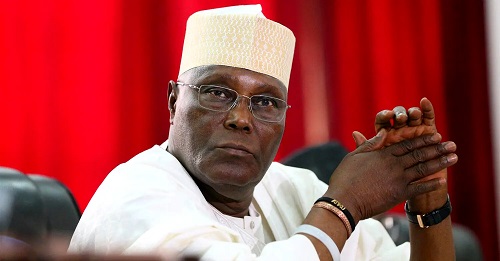•PDP candidate says he won’t run after 2023
•Discloses Buhari gave him personal commitment of free, fair polls
•Pledges to remove petrol subsidy in first 100 days
The complicated ‘electoral maths’ of Africa’s largest economy may count in favour of the Peoples Democratic Party (PDP) candidate, Atiku Abubakar, in next February’s general elections, a Financial Times report has indicated, quoting close aides of the politician as well as selected political analysts.
Stressing that no one in Nigeria’s history has run for president more times than Atiku, with the top prize eluding him on each of the five occasions, the report stressed that in February, the former vice president will make his sixth attempt as Nigerians choose a replacement for outgoing President Muhammadu Buhari.
“It is a life-long ambition and as long as I’m alive and strong and healthy, I will continue pursuing it,” Abubakar told the Financial Times at his suite in one of Lagos’s most luxurious hotels after a campaign rally.
But he quickly suggested this would be his final act: “I’ve come to the last stage now. I don’t think after this I will run again,” FT quoted him as saying.
Amid a throng of jubilant supporters in the hotel lobby, an unnamed long-serving Atiku aide, the report said, sketched out his 76-year-old boss’s route to victory.
Atiku, he said, would give his opponents a close run in their southern strongholds and take advantage of Buhari’s absence on the ballot for the first time since 1999 to win the vote-rich north by a wide margin.
The election will pit Atiku, of the opposition PDP, against Bola Tinubu of the ruling All Progressives Congress (APC), and Peter Obi, of the Labour party (LP), who it said has emerged as the first credible third-party candidate since Nigeria’s return to democracy 23 years ago.
It recalled a recent poll of registered voters in rural communities in 12 of the 36 states which put Obi ahead.
Africa Director at the Eurasia Consultancy, Amaka Anku, said Abubakar had advantages that could work in his favour. “Atiku is a household name and being well known across the north and being a northerner, given the structure of Nigeria’s voter rolls, is a major selling point,” she said.
But his success is not guaranteed. Voters may have become “jaded” by his repeated attempts at the presidency, she said.
Oil was key to turning the economy around, he said. Years of under-investment in infrastructure and large-scale theft have depressed oil production. In a year where oil-producing nations have recorded significant revenue boosts, Nigeria produces a little over 1 million barrels a day of crude, far below its Organisation of Petroleum Exporting Countries (OPEC) daily quota of 1.8 million barrels.
The country is set to spend $9 billion on fuel subsidies this year, and previous presidents have shied away from reform, the FT stated.
“I will remove fuel subsidy,” he told the Financial Times. “Within the first 100 days in office, we should be able to make a decision.” He also promised to provide a “road-map” on how the money saved will be spent.
Attempts at privatising NNPC, the state-owned oil company whose shares are owned by the federal government, were muddled, he said.
“I will have to study the so-called privatisation and see how we can review it and make sure that it conforms with our expectations which is realising as much revenue as possible,” Atiku added.
He also pledged to reform Nigeria’s multiple exchange rates with “a unified exchange rate or a maximum of two” in conjunction with the central bank.
Some $10 billion would be allocated to small and medium-sized enterprises to create jobs, money he claimed would be raised by the privatisation of state-owned refineries and savings from fuel subsidies.
With a public debt of $103 billion, he said he would have “to approach our creditors to see how we can renegotiate and reschedule repayments”. He also plans to cut down on public sector expenditure, which he described as “expenditure not in favour of development”.
On crime and security, Atiku said he would increase the number of police officers and other security service personnel and “train and equip them better”. He is also considering introducing state policing, a departure from Nigeria’s centralised force.
He said he planned to form a government of national unity that would include opposition politicians. When pressed if there could be a job for Obi, his running mate in 2019, he responded: “Why not?” Asked in what capacity, he said: “Let’s win the elections before thinking of roles people can play.”
Atiku, the report suggested, is still stung by his 2019 defeat, an election many expected would be a close race but ended with Buhari’s re-election by almost 4 million votes, extending his margin of victory from the previous poll.
Atiku claimed the vote was stolen: “All well-informed sources believe I was rigged out,” he said. He added that this election would be harder to manipulate because of reforms, including the electronic transmission of results, by the electoral commission that have been deployed in recent gubernatorial elections.
The former vice president also said he had received personal assurances from Buhari that the polls would be free. “I’ve gotten a commitment from the president personally, because I sat down with him twice, that even if it is the only legacy he will leave, he will make sure he conducts free, fair and credible polls,” he added.



